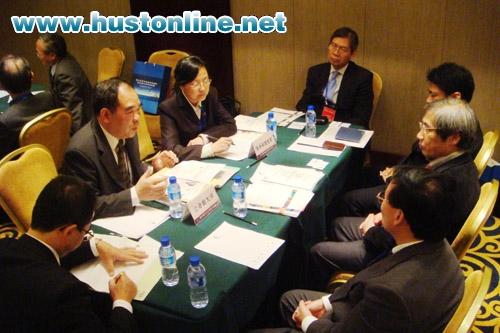From Oct. 15 to Oct. 16, the 6th Sino-Japan University Presidents Forum, hosted by Chinese Ministry of Education and co-organized by Nankai University, was held at Xing-shen building of Nankai University. Lin Pinghua, Executive Vice President of HUST, and Cheng Runwen, Assistant Director of HUST's International Exchange Center, attend the forum.
Zhou Ji, Chinese Minister of Education as well as Kawabata Tatsuo, Japan's Minister of Education, Culture, Sport, Science & Technology MEXT , sent congratulatory letters to the Forum. Among the distinguished present are Yuan Guiren, Deputy Minister of Chinese Ministry of Education, Shimizu Ketsu, Deputy Minister of Japanese MEXT, and Gou Lijun, Standing Committee Member of the Municipal Party Committee of Tianjin and Secretary of Tianjin Education & Health Committee.
Besides, nearly 150 delegates attend the Forum, consisting of presidents and relevant officials from 18 Chinese universities including Peking University, Tsinghua University, and Huazhong University of Technology and Science, and 17 Japanese universities such as University of Tokyo, Kyoto University, and Waseda University.
In his congratulatory letter, Zhou Ji points out that the educational collaboration between China and Japan has gained continuous momentum through the strenuous endeavor undertaken by both two countries ever since the normalization of Sino-Japanese relationship, especially after the implementation of China's reform and opening-up policy. Moreover, in the context of globalization and Asian Regional Cooperation, collaboration between both Chinese and Japanese universities will definitely strengthen the friendship between two countries and boost their economic growth. Thus, he believes that, the Sino-Japanese University Presidents Forum, setting a central platform for the educational communication and cooperation between the two countries, will produce positive impacts on both sides' reformation and development in education, while benefiting the prosperity and stability of the Asian-Pacific region.
In addition, Kawabata Tatsuo mentions that nowadays, the universities' capacity of making contribution to the society is becoming increasingly distinct and the voice for international university collaborations is striking a tone clearer and more forceful than ever. Under these circumstances, the positive effect of this Forum is substantial in sharing successful experience, promoting educational reform and development and accelerating the internationalization of higher education.
This Forum is aimed at strengthening the Sino-Japanese communication and cooperation in education, and promoting mutual understanding between both managerial department of Education and individual universities of the two countries. The theme of the Forum is "the Internationalization of creative talents' training and the mission of leading universities in China and Japan", supplemented by three subtopics: 1 the Internationalization of creative talents' training theory & practice; 2 National strategies in creative talents' training and university development Focusing on Project 211 and 985/ 21st century COE and global COE; 3 Feasibility of implementing transnational education programs in China and Japan. Additional activities, including "Sino-Japanese University Presidents Talks" and "Sino-Japanese Partnership Communication", were also held on the sidelines of the Forum.
Mr. Lin Pinghua delivers a speech titled "Reflection on Positioning of Chinese Universities" in which he makes a comparison between Chinese and Japanese universities. He elaborates on the reality facing the development of science and technology in China, the historical missions of leading universities and his personal four-year experience of studying in Japan. He points out that five issues still need further discussion, which include 1 whether universities should address the needs of society at the same time of answering what the nation calls for; 2 how universities weigh between academic contributions and commercialism; 3 whether the nation aims to develop world-class universities or world-class higher education system; 4 what universities choose to focus on, science, technology or engineering; 5 whether universities should be oriented to disciplines, practical problems or industries. He finally draws the conclusion that the appropriate positioning of a university determines the promising prospects of its own. This speech grabs the interest and attention of all the present presidents.
In the Sino-Japan Partnership Communication Session, HUST has a profound dialogue with Ritsumeikan University and Kyoto University, aiming to consolidate the present collaboration and communication and furthermore explore new sphere for cooperation. Strenuous efforts will be made by the three universities to promote substantive cooperation and students` communication between the two nations. Besides, in-depth discussion concerning issues of shared interest is held between HUST and Kyushu University, Tokyo Institute of Technology and Hiroshima University.

Related information:
The First Sino-Japanese University Presidents Forum was held in Tokyo, co-sponsored by Peking University and the University of Tokyo in October, 2000. Thereafter, in line with the Sino-Japanese Five-Year Plan of Educational Collaboration, Chinese Ministry of Education and MEXT laid great emphasis on the Forum and formally began their involvement since the Second Forum in 2003. So far the Forum has been successfully held six times. Through years of communication, the two sides have exchanged penetrating views on issues of common concerns, reached general consensus and strengthened pragmatic cooperation. Both sides agree that the Forum serves as an important platform for the communication concerning higher education and has yielded positive effects on the educational reform and development of the two nations. The seventh Forum will take place in Kyoto in two years.
Since the fourth Forum in 2005, HUST has participated in three editions of the Forum.
Related News
- HUST Alumnus Ye Yinyu Awarded the Highest Prizein Operations Research and the Management Sciences
- New Energy Research Institute Established by Wuhan Municipal Government and HUST
- Our Students Awarded the Highest International Prize for In-School Young Designers
- National College Students' Energy Conservation & Emission Reduction Competition Final Held





